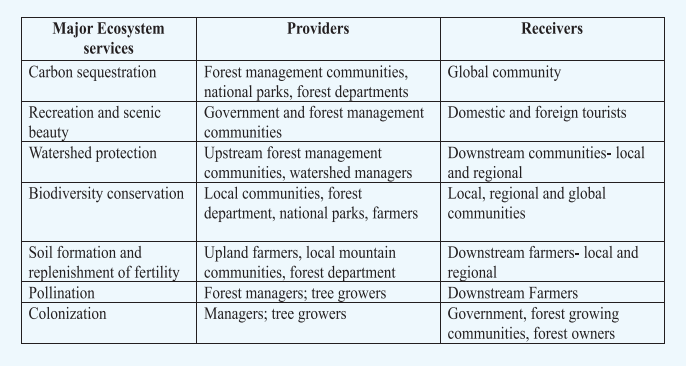Gross Environment Product (GEP) | 26 Jul 2021
Why in News
Recently, the Uttarakhand government has announced that it will initiate valuation of its natural resources in the form of ‘Gross Environment Product’ (GEP).
- It is along the lines of Gross Domestic Product (GDP). GDP gives the economic output from the consumers’ side. It is the sum of private consumption, gross investment in the economy, government investment, government spending and net foreign trade (the difference between exports and imports).
Key Points
- About GEP:
- It was established back in 1997 by ecological economists like Robert Costanza at the global level.
- It is an assessment system to measure ecological status.
- It is considered as the product and service value that the ecosystem provides for human welfare and economic and social sustainable development, including provisioning, regulating and cultural ecosystem services.
- Overall, GEP accounts for the economic value of the ecosystem in providing products and services, and it is one of the components of green GDP.
- Green GDP is an indicator of economic growth with environmental factors taken into consideration along with the standard GDP of a country. It factors biodiversity losses and costs attributed to climate change.
- The term “ecosystem services” was coined in 1981 to attract academics towards this aspect, its definition is still in the process of evolution.
- Ecosystems that can be measured include natural ecosystems such as forests, grassland, wetland, desert, freshwater and ocean, and artificial systems that are based on natural processes like farmland, pastures, aquaculture farms and urban green land, etc.
- Need:
- Uttarakhand, through its biodiversity, gives services to the tune of Rs 95,112 crore per year to the nation.
- The state has over 71% area under forests.
- It is also home to the Himalayas and also is the origin point of rivers like Ganga, Yamuna and Sharada as well as home to wildlife reserves like Corbett and Rajaji Tiger Reserves.
- Uttarakhand is a state which provides a lot of environment services and in continuity as a result of which, there is a natural degradation in those services.
- Significance:
- The value of ecosystem services is about twice as much as the global GDP. Therefore, it would help in the conservation of the environment and also help save us from the effects of climate change.
- Issues:
- The decision appears to be a welcome step, but going ahead with the jargon raises serious doubts on the intent of the government. It may confuse policy makers and negate the past efforts.
- The purpose of introducing GEP is not transparent.
- Is it a process of simple valuation of a state's ecological wealth, or to assess what part of the GDP it contributes.
- Is it an attempt to claim a budget from the centre against ecosystem services the state provides to the rest of the country and / or a process of providing benefits to its own residents.
Way Forward
- Instead of introducing a well-defined concept of ecosystem services, planting a new term with no clear-cut narrative invites serious doubts on the intention of the government.
- So, it is important that the state should be steady in approach, focussing on Ecosystem Services, which has global acceptance and a strong knowledge base.

